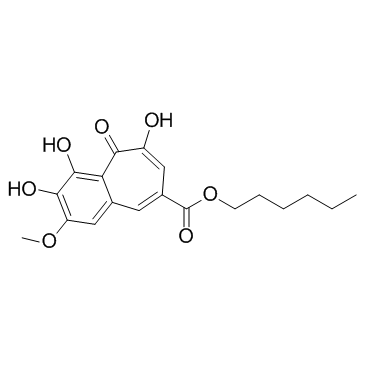| Description |
CU CPT 22 is a toll-like receptor 1 and 2 (TLR1/2) inhibitor with an IC50 of 0.58 µM.
|
| Related Catalog |
|
| Target |
IC50: 0.58 μM (TLR1/2)[1]
|
| In Vitro |
CU CPT 22 is a toll-like receptor 1 and 2 (TLR1/2) inhibitor with an IC50 of 0.58±0.09 µM. It is demonstrated that CU CPT 22 is able to compete with Pam3CSK4 for binding to TLR1/2 with an inhibition constant (Ki) of 0.41±0.07 µM, which is consistent with its potency observed in the whole cell assay. Increasing the concentration of CU CPT 22 to 6 µM decreases the anisotropy to background levels. It is found that CU CPT 22 inhibits TLR1/2 signaling without affecting other TLRs, showing it is highly selective in intact cells. CU CPT 22 is found to have no significant cytotoxicity at various concentrations up to 100 µM in RAW 264.7 cells. The result demonstrates that CU CPT 22 can inhibit about 60% of TNF-αand 95% of IL-1β at 8 µM[1].
|
| Kinase Assay |
RAW 264.7 cells are planted in 6-well plates at 1,000,000 cells per well with 3 mL of medium and grown for 24 h at 37°C in a 5% CO2 humidified incubator. After 24 h, non-adherent cells and media are removed and replaced with fresh RPMI 1640 medium (3 mL/well). Two wells of adherent macrophages are treated with Pam3CSK4 (300 ng/mL) as the positive control, two wells are treated with 8 μM CU CPT 22, and the other two wells are treated with 8 μM compound DMSO. Plates are then incubated for an additional 24 h. The medium is removed, the cells are washed with PBS (3×1 mL), the plate is put on ice, then 500 μL of lysis buffer is added to each well. The production of the cytokine interleukin-1β (IL-1β) and TNF-α is quantified with enzyme-linked immunosorbent assays (ELISA). The cytokine level in each sample is determined in duplicate[1].
|
| References |
[1]. Cheng K, et al. Discovery of small-molecule inhibitors of the TLR1/TLR2 complex. Angew Chem Int Ed Engl. 2012 Dec 3;51(49):12246-9.
|




